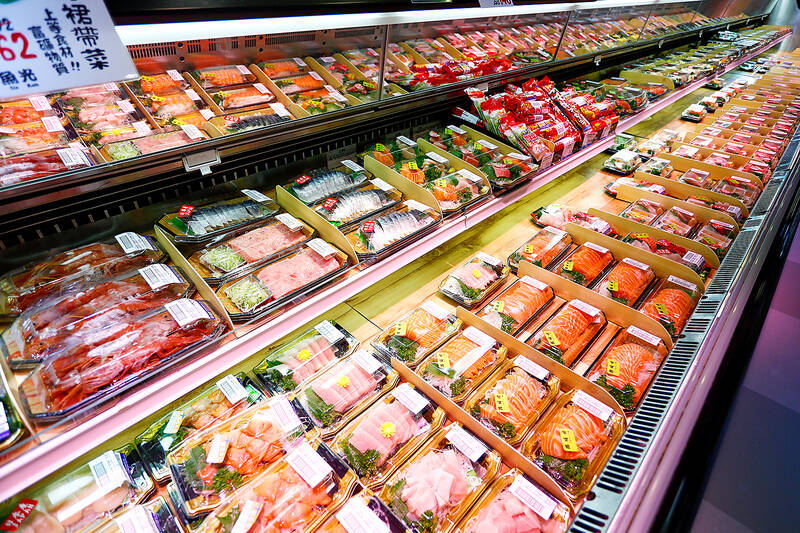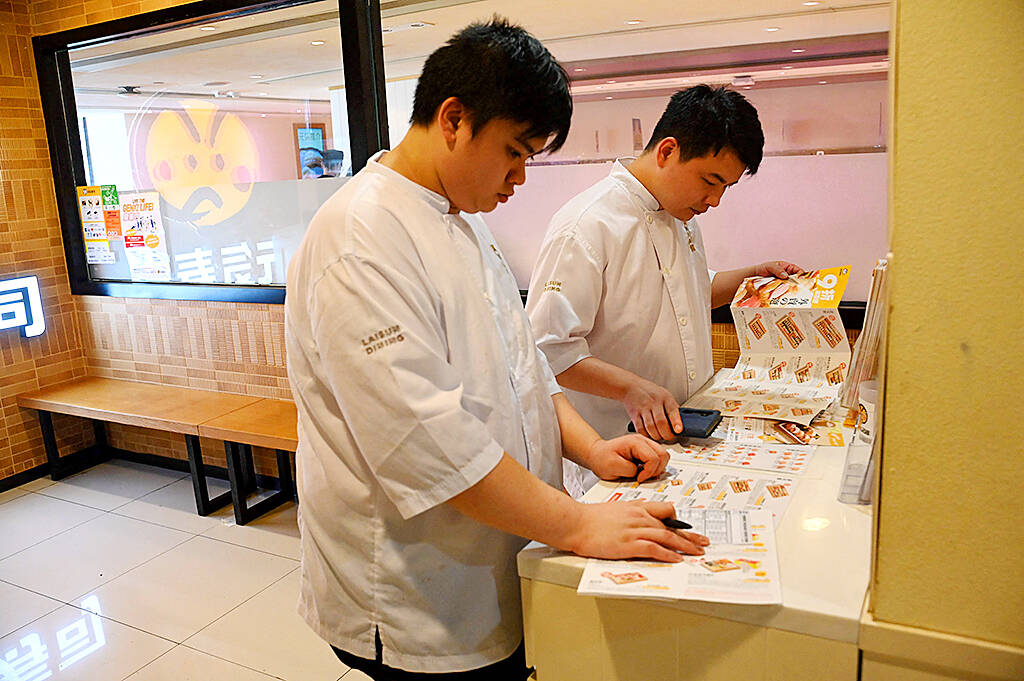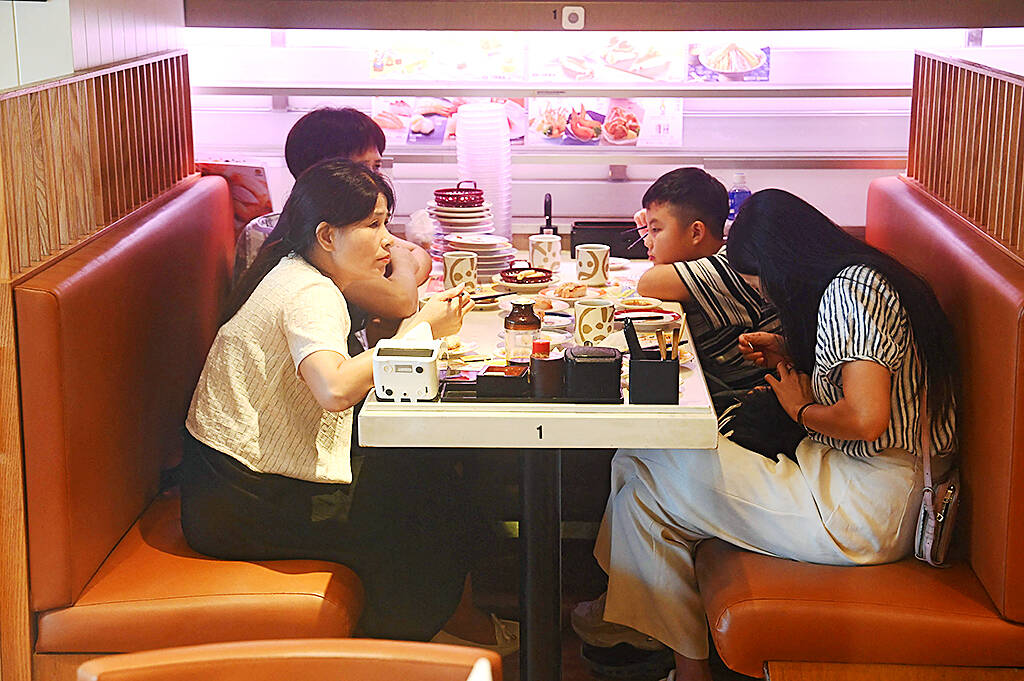At his restaurant in central Beijing, controversy over the release of Fukushima wastewater has left Yao facing a choice: continue stocking his popular Japanese tuna and risk the ire of some consumers or source it from other countries where price and quality could vary.
Chinese sushi and sashimi lovers have expressed reservations after Japan kicked off plans for the disposal of waste from the stricken power plant into the Pacific Ocean, 12 years after one of the world’s worst nuclear disasters.
The intended release has been deemed safe by the International Atomic Energy Agency (IAEA), but China nonetheless banned food imports from 10 Japanese prefectures, with Hong Kong following suit this week.

Photo: EPA-EFE
Restaurants in Beijing and Hong Kong are already reeling from the restrictions. “To tell the truth, we have felt the impact,” said Yao at the entrance of his restaurant.
Hong Kong food caterer Jasy Choi, who runs a small kitchen for takeaway Japanese food, said the ban would cause a business overhaul.
“About 80 percent of the seafood products we use come from Japan,” the 36-year-old chef said. “If more than half of my Japan-imported ingredients are affected, then it would be difficult for me to continue to operate.”

Photo: AFP
China and Hong Kong are the largest importers of Japanese foodstuffs in the world, according to Tokyo’s agriculture ministry, bringing in around 500 billion yen (US$3.44 billion) worth of products from the East Asian country. But the release has some consumers concerned about safety. At a chain restaurant in Beijing, as small plates of sushi and other Japanese dishes glided by on a conveyor belt, mother Liu Dan underlined these fears. “From August 24, I’ll specifically tell my child and husband that we will consciously avoid these seafood products when eating at restaurants and shopping,” she said.
Asked about scientific reports concluding that Japan’s wastewater release plan is safe — including one published in July by the IAEA — Liu expressed doubt.
“I have no way of proving whether or not (such reports) are true. I can just say that judging from the plainest of feelings, this definitely isn’t rational,” she said. “Otherwise why would there be worries about the release?”

Photo: AFP
ROCK AND HARD PLACE
China’s foreign ministry summoned Japan’s ambassador on Tuesday to lodge “solemn representations” against the release.
A nuclear expert, however, said the level of tritium in the Fukushima wastewater was well below WHO drinking water limits.
“Tritium has been released (by nuclear power plants) for decades with no evidential detrimental environmental or health effects,” said Tony Hooker, a nuclear expert from the University of Adelaide.
But many restaurant owners in China said they have already stopped buying Japanese fish.
“Before, essentially all of our seafood products were imported from Japan,” Fang Changsheng said in one of his two restaurants, located in a Beijing district popular for Japanese cuisine and nightlife.
The 40-year-old restaurateur says he now sources seafood from elsewhere, including Chile, Spain and Russia.
“It wasn’t really my decision, but due to this (Fukushima wastewater) issue. Getting products is now more of a pain.”
However, at a small sushi restaurant which seats less than 20 people in Hong Kong’s bustling Wan Chai district, Jacky Wong said many customers likely wouldn’t be put off. “It very much depends on how many Hong Kong customers would avoid having Japanese food... There are always some people who would not mind,” Wong said, adding that he would have to take a few days to see if foot traffic drops post-ban. “We can only take one step at a time.”
And some seafood products traditionally sourced from Japan are proving difficult to replace.
Choi in Hong Kong also said that finding substitutes would be difficult. “And even if there are substitutes — say, sea urchin from China, South Korea or Australia, I may not want to offer those to my customers,” he fretted.
“Of course, it’s not good to release nuclear wastewater into the sea, even if it’s treated,” he added.
“But many places around the world have been doing this. How can you ban them all and what change can we small citizens bring?”

Under pressure, President William Lai (賴清德) has enacted his first cabinet reshuffle. Whether it will be enough to staunch the bleeding remains to be seen. Cabinet members in the Executive Yuan almost always end up as sacrificial lambs, especially those appointed early in a president’s term. When presidents are under pressure, the cabinet is reshuffled. This is not unique to any party or president; this is the custom. This is the case in many democracies, especially parliamentary ones. In Taiwan, constitutionally the president presides over the heads of the five branches of government, each of which is confusingly translated as “president”

Sept. 1 to Sept. 7 In 1899, Kozaburo Hirai became the first documented Japanese to wed a Taiwanese under colonial rule. The soldier was partly motivated by the government’s policy of assimilating the Taiwanese population through intermarriage. While his friends and family disapproved and even mocked him, the marriage endured. By 1930, when his story appeared in Tales of Virtuous Deeds in Taiwan, Hirai had settled in his wife’s rural Changhua hometown, farming the land and integrating into local society. Similarly, Aiko Fujii, who married into the prominent Wufeng Lin Family (霧峰林家) in 1927, quickly learned Hoklo (commonly known as Taiwanese) and

The low voter turnout for the referendum on Aug. 23 shows that many Taiwanese are apathetic about nuclear energy, but there are long-term energy stakes involved that the public needs to grasp Taiwan faces an energy trilemma: soaring AI-driven demand, pressure to cut carbon and reliance on fragile fuel imports. But the nuclear referendum on Aug. 23 showed how little this registered with voters, many of whom neither see the long game nor grasp the stakes. Volunteer referendum worker Vivian Chen (陳薇安) put it bluntly: “I’ve seen many people asking what they’re voting for when they arrive to vote. They cast their vote without even doing any research.” Imagine Taiwanese voters invited to a poker table. The bet looked simple — yes or no — yet most never showed. More than two-thirds of those

In the run-up to the referendum on re-opening Pingtung County’s Ma-anshan Nuclear Power Plant last month, the media inundated us with explainers. A favorite factoid of the international media, endlessly recycled, was that Taiwan has no energy reserves for a blockade, thus necessitating re-opening the nuclear plants. As presented by the Chinese-language CommonWealth Magazine, it runs: “According to the US Department of Commerce International Trade Administration, 97.73 percent of Taiwan’s energy is imported, and estimates are that Taiwan has only 11 days of reserves available in the event of a blockade.” This factoid is not an outright lie — that